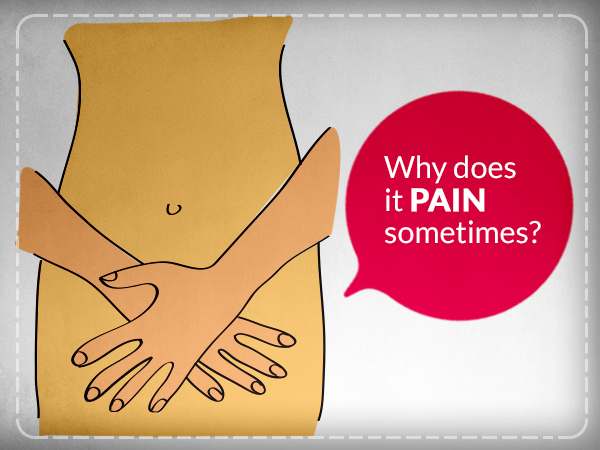 Most women will experience pain during sex also called as ‘Dyspareunia’ at some time during their lives. For some women, this is a temporary concern but for some this might be a long-term health condition disrupting or damaging their sex lives.
Most women will experience pain during sex also called as ‘Dyspareunia’ at some time during their lives. For some women, this is a temporary concern but for some this might be a long-term health condition disrupting or damaging their sex lives.
Pain during or after sex affects sexual relationship between partners and note that there can be various physical, emotional or psychological reasons for experiencing painful sex.
Where would you experience pain?
Women suffering from Dyspareunia may experience pain during penetrative sex, thrusting, and burning pain or ache near the opening or within the vagina or the area between vagina and anus. Some may also feel pain in pelvic region, uterus or bladder or soreness in vulva or lower back.
Causes responsible for painful sex
Probable Physical reasons causing painful sex
- If suffering from Sexually Transmitted Infections (STI), or Urinary Tract Infections (UTI) affecting genital area, reproductive organs, vaginal health or urinary tract.
- Infections that harm the skin, skin related disorders like contact dermatitis that affects vagina and causes itching, burning and pain during the sex. Any sort of inflammation, injury, surgery or trauma that affects your reproductive organs or genitals will make sexual intercourse hurtful.
- If you have any of these reproductive health conditions like Endometriosis, Ovarian cysts, Fibroids,
-

- Pelvic Inflammatory Disease (PID) then also it may lead to pain during sex. Get a physical examination done by your gynecologist to diagnose or know if or not, you are suffering from any of these conditions.
- Lesser lubrication or vaginal dryness in a woman during sex can lead to painful sex. There can be various reasons for insufficient lubrication like lack of sexual arousal or desire, insufficient foreplay before penetrative sex, lesser estrogen levels in women during perimenopause, menopause, right after childbirth or when they are breastfeeding.
- Vaginismus is a common condition in women, in which there occurs an involuntary contraction or tightening of muscles at the opening of the vagina or vaginal wall that cause pain during intercourse. Vaginismus can also occur due to psychological fear of being hurt during sex or having negative emotions towards the idea of having sex.
- Sex just after having a baby can be painful as the woman’s body is still recovering and healing itself from the physical wear and tear and effects of labor and childbirth.
- Any form of abnormality acquired since birth; that hampers normal development of vagina (congenital abnormality) could also be the cause of painful sex.
Emotional reasons leading to a painful sex
- Mental health problems like stress, anxiety, depression, self esteem or body image issues (worrying about one’s appearance while having sex).
- Relationship issues like lack of intimacy, sexual arousal or desire between partners can make sex less of an expression of one’s love or pleasure and makes it more of a task.
- Women who have experienced any form of sexual abuse or violence before or are experiencing can have feeling of discomfort or emotional hurt that often makes sex painful.
- An upbringing or a mindset that creates a negative idea towards sex, something that is sinful or cringe worthy, hence feeling guilty for having sex or psychological fear of being hurt during sex, may also lead to painful sexual intercourse.
Out of all the above mentioned possible causes of Dyspareunia, one needs to figure out and know what affects them the most.
If you are suffering from painful sex; consult your Gynecologist and get a physical examination done soon as possible. Talk to your Gynecologist or Sexologist (Reproductive and Sexual Medicine expert) for further treatment and counseling.
The doctor may conduct a pelvic examination and will ask about your sexual history, lifestyle and about your relationship with your partner.
Don’t feel embarrassed; try to be honest, as the transparency will help the doctor in treating you correctly.





,